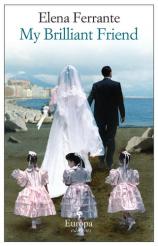My Brilliant Friend
Review
My Brilliant Friend
This portrait of camaraderie, community and a nation centers on the stories of lifelong friends Elena Greco and Lila Cerullo, two Italian women who grew up together in the same small town just outside of Naples in the years immediately following World War II. The story of their childhoods is told here, reminiscent of a nation facing drastic change. The girls, in early adolescence, are forced down vastly differing paths due to very slight differences in their families’ economic status, leading one toward uncertainty while the other enjoys the unrequited benefits of higher education.
This first of a planned trilogy brings to life an old-world culture and fills readers with a passion for history and great storytelling. Elena artfully recalls her childhood, describing her earliest school days at a time when ordinary townsmen called for blunt action and despair. The neighborhood is consumed with a silent, inarticulate rage, shown toward rival families, by parents toward their offspring, and by neighborhood children toward one another. It was a common event of the age to witness a child being beaten by a family member or neighborhood kid, so no one interfered or paid much attention. Life was especially hard for young women and the poorer folks of small communities (which at that time seemed to be just about everyone).
"I would recommend this book freely to anyone who enjoys history of any kind or a well-written novel. The ending is entirely unconventional and unexpected, so creative that it takes the reader’s breath away and makes one hungry for the next installment."
The emphases for these families were dwindling resources, the simple ability to put food on the plate and pay the bills, and the need to provide cheap (child) labor. Women were expected to remain mute and meek always, and to further their families’ needs at the expense of their pride and feelings. Family feuds happened routinely; everyone knew about them. But Lila and Elena learned as children --- largely through the power and support of friendship, and due to the positive influence of an exceptionally shrewd and motivating female teacher --- to stand up for themselves, and against all odds, face their fears and find creative solutions to problems, starting with the most immediate one of what to do about their futures.
By embracing pure intellectualism, these girls find a way to cope with their existence and to gather a glimmer of hope. The age is ripe for the Maestro of the school to exert her powers over her pupils, by pitting them against one another, recognizing good work, and challenging all to rise above circumstance and need.
This is the basis of Lila and Elena’s early friendship: rivalry and competition. Lila happens to be the most gifted person in her class, and the most hated and taunted child at school. She brazenly flaunts her brilliance, and seems fierce and unafraid. Likewise, Lila seems to find in Elena the one person content and motivated enough to follow her, and the only one who can see clearly to the core of who she is.
Yet, as luck would have it, the girls’ paths seem fated to diverge early on. Once the time has come to advance in school, Lila’s father refuses to pay the necessary fees (either because he’s unable or unwilling,) whereas Elena’s father is a porter and so slightly better off. Because the Cerullos are shoemakers by trade, they’ve become a very despondent bunch, watching the family business slowly dwindle due to the advent of new technologies and factories. Lila’s father seems content to leave her laboring and virtually imprisoned in his shoe repair shop --- a situation she despises to the core and that offers no security. Lila also feels keenly the loss of any future for herself through a legitimate education, which to her equates to the loss of free will.
So it is that, by the end of this first installment, Lila becomes a young woman suffering very bitterly for her losses and her simple inability to change her life. The book moves very quickly from her earliest attempts to self-educate alongside Elena, toward other, less certain pursuits wherein Lila hopes to change her lot by influencing others she knows. Hoping for good things to happen, she makes some desperate moves that will clearly come back to haunt her. Her best intentions become twisted in the pursuit of happiness and success, and in the process, both Lila and Elena unwittingly give up on the possibility of real love or the self-empowerment that comes from genuine devotion. Ironies abound.
MY BRILLIANT FRIEND is an extraordinarily meaningful and absorbing read. I can really think of no better praise than to simply say I loved it, though that seems inadequate commendation for such a supremely talented author. I would recommend this book freely to anyone who enjoys history of any kind or a well-written novel. The ending is entirely unconventional and unexpected, so creative that it takes the reader’s breath away and makes one hungry for the next installment.
Reviewed by Melanie Smith on October 19, 2012
My Brilliant Friend
- Publication Date: September 25, 2012
- Genres: Fiction
- Paperback: 336 pages
- Publisher: Europa Editions
- ISBN-10: 1609450787
- ISBN-13: 9781609450786





